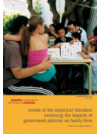Policymakers need to consider possible impacts on families when designing and implementing policies and services. This report documents a systematic review of empirical literature that considers the impacts of government policies on partnership formation, dissolution and reconstitution, fertility decision-making and family size, and family living arrangements.
Purpose
This report adopts a systematic review methodology to:
- assess New Zealand and international evidence on the actual impacts of government policies on family formation, size, dissolution, reconstitution, and living arrangements, regardless of family legal status
- identify areas for further empirical research in New Zealand
- outline implications for New Zealand policy.
Methodology
It was decided to conduct a ‘systematic’ literature review, in order to identify, collate and synthesise the relevant literature. Systematic reviews aim explicitly to adopt a rigorous review methodology, based on the development of a review ‘protocol’. Systematic review methods have been widely utilised in healthcare research (eg The Cochrane Collaboration and the Centre for Reviews & Dissemination, University of York). Systematic reviews are now also being conducted on social and behavioural interventions and public policy, including education, criminal justice and social welfare (see The Campbell Collaboration Initiative).
A systematic review is a method of comprehensively identifying, critically appraising, summarising and attempting to reconcile the research evidence on a specific question. The Cochrane Reviews have developed a standard format for conducting their reviews (Alderson et al 2004). In general, systematic reviews can be conceptualised as a series of steps, outlined in detail in a review protocol.
- Scoping Phase: Formulating the problem and the scope of the review, anddeveloping the review protocol
- Search Phase: Locating and selecting studies according to the protocol
- Review Phase: Quality assessment of studies and their results
- Analysis Phase: Analysing the results of individual and groups of studies
- Synthesis and Reporting Phase: Interpreting the results
Key Results
The report concludes that government plays a relatively minor role in influencing decisions to form couples, bear children, or end relationships. There is no evidence that government policies have been a primary driver of the major social and demographic changes affecting family form that have occurred over the past 40 years.
The importance of social and cultural context is highlighted by variations in patterns of partnering, relationship breakdown, and childbearing across countries and between different ethnic groups within the same country. Thus the applicability of international findings to the New Zealand setting may be limited.
The report identifies a lack of high-quality New Zealand research and concludes with specific recommendations for future research in the New Zealand context.

